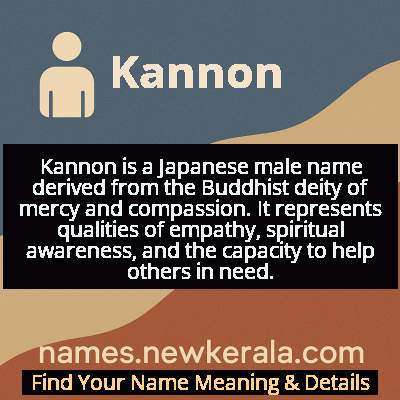Kannon Name Meaning & Details
Origin, Popularity, Numerology Analysis & Name Meaning of Kannon
Discover the origin, meaning, and cultural significance of the name KANNON. Delve into its historical roots and explore the lasting impact it has had on communities and traditions.
Name
Kannon
Gender
Male
Origin
Japanese
Lucky Number
6
Meaning of the Name - Kannon
Kannon is a Japanese male name derived from the Buddhist deity of mercy and compassion. It represents qualities of empathy, spiritual awareness, and the capacity to help others in need.
Kannon - Complete Numerology Analysis
Your Numerology Number
Based on Pythagorean Numerology System
Ruling Planet
Venus
Positive Nature
Harmonious, responsible, caring, and artistic.
Negative Traits
Overly idealistic, superficial, possessive, or jealous.
Lucky Colours
Pink, turquoise.
Lucky Days
Friday.
Lucky Stones
Diamond, turquoise.
Harmony Numbers
2, 3, 9.
Best Suited Professions
Artists, musicians, teachers, healthcare workers.
What People Like About You
Warmth, nurturing nature, artistic flair.
Famous People Named Kannon
Kannon Bosatsu
Buddhist deity
Revered Bodhisattva of compassion in Japanese Buddhism
Kannon Tachibana
Sumo wrestler
Edo period sumo wrestler who reached sekiwake rank
Kannon Abe
Contemporary artist
Modern painter blending Buddhist themes with contemporary art
Name Variations & International Equivalents
Click on blue names to explore their detailed meanings. Gray names with will be available soon.
Cultural & Historical Significance
The deity appears in various forms, sometimes depicted with multiple arms symbolizing the ability to help many people simultaneously, or with eleven heads to hear the cries of the suffering. Kannon's cultural impact extends beyond religion into art, literature, and daily life, where the concept of 'kannon-bi' (Kannon beauty) describes a particular type of serene, compassionate beauty. The name continues to carry these deep cultural associations in modern Japan, representing both religious devotion and the valued human qualities of empathy and kindness.
Extended Personality Analysis
Individuals named Kannon are often perceived as compassionate, empathetic, and spiritually inclined. They tend to possess a natural ability to understand others' suffering and frequently take on supportive roles in their relationships and careers. The name carries expectations of kindness, patience, and a calming presence that can soothe troubled situations. People with this name often demonstrate strong intuition and emotional intelligence, making them excellent counselors, healers, or mediators.
They typically value harmony and will go to great lengths to avoid conflict while helping others find peaceful resolutions. The spiritual connotations of the name may also suggest someone who is reflective, wise beyond their years, and possesses a deep inner strength that enables them to endure challenges while maintaining their compassionate nature. However, they may sometimes struggle with setting boundaries, as their natural inclination is to help others even at personal cost. The name implies a person who is both spiritually aware and practically helpful, balancing idealism with genuine care for others' wellbeing.
Modern Usage & Popularity
In contemporary Japan, Kannon remains a meaningful though uncommon given name for boys, maintaining its spiritual and cultural significance while adapting to modern naming trends. The name has seen steady but limited usage, primarily among families with strong Buddhist connections or those seeking a name with deep cultural roots. While not among the most popular names in recent decades, it continues to be chosen by parents who value its historical significance and the positive qualities it represents. The name has also gained some international recognition through cultural exchange, with occasional use in Western countries among families interested in Japanese culture or Buddhism. Modern bearers of the name often appreciate its unique quality while carrying forward the legacy of compassion and spiritual depth that has characterized the name for centuries.
Symbolic & Spiritual Meanings
The name Kannon symbolizes boundless compassion, mercy, and the ideal of selfless service to others. It represents the Buddhist concept of karuna - the willingness to bear witness to suffering and actively work to alleviate it. Symbolically, Kannon embodies the qualities of a spiritual guardian who hears the cries of the world and responds with unconditional love and assistance. The name carries connotations of healing, protection, and emotional support, suggesting someone who can provide comfort in times of distress. In a broader sense, Kannon represents the human capacity for empathy and the transformative power of compassion in overcoming suffering and creating harmony in relationships and communities. The symbolic meaning extends to include wisdom, as true compassion requires understanding the nature of suffering and its causes.

